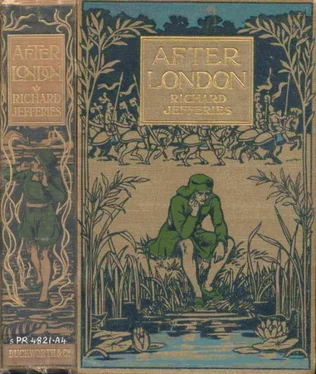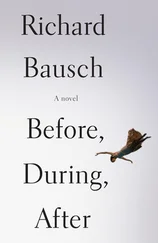Richard Jefferies - After London
Здесь есть возможность читать онлайн «Richard Jefferies - After London» весь текст электронной книги совершенно бесплатно (целиком полную версию без сокращений). В некоторых случаях можно слушать аудио, скачать через торрент в формате fb2 и присутствует краткое содержание. Город: London, Год выпуска: 1905, Издательство: Duckworth & Co., Жанр: sf_postapocalyptic, на английском языке. Описание произведения, (предисловие) а так же отзывы посетителей доступны на портале библиотеки ЛибКат.
- Название:After London
- Автор:
- Издательство:Duckworth & Co.
- Жанр:
- Год:1905
- Город:London
- ISBN:нет данных
- Рейтинг книги:4 / 5. Голосов: 1
-
Избранное:Добавить в избранное
- Отзывы:
-
Ваша оценка:
- 80
- 1
- 2
- 3
- 4
- 5
After London: краткое содержание, описание и аннотация
Предлагаем к чтению аннотацию, описание, краткое содержание или предисловие (зависит от того, что написал сам автор книги «After London»). Если вы не нашли необходимую информацию о книге — напишите в комментариях, мы постараемся отыскать её.
(1885), set in a future in which urban civilization has collapsed after an environmental crisis.” (From
).
This eBook is for the use of anyone anywhere at no cost and with almost no restrictions whatsoever. You may copy it, give it away or re-use it under the terms of the Project Gutenberg License included with this eBook or online at
* * *
After London — читать онлайн бесплатно полную книгу (весь текст) целиком
Ниже представлен текст книги, разбитый по страницам. Система сохранения места последней прочитанной страницы, позволяет с удобством читать онлайн бесплатно книгу «After London», без необходимости каждый раз заново искать на чём Вы остановились. Поставьте закладку, и сможете в любой момент перейти на страницу, на которой закончили чтение.
Интервал:
Закладка:
The rest were not so appeased; they desired the Baron’s destruction if only from hatred of his popularity, and they lost no opportunity of casting discredit upon him, or of endeavouring to alienate the affections of the people by representing him as a magician, a thing clearly proved by his machines and engines, which must have been designed by some supernatural assistance. But the chief, as the most immediate and pressing danger, was the debt to Francis the notary, which might at any moment be brought before the Court.
Thus it was that the three sons found themselves without money or position, with nothing but a bare patent of nobility. The third and youngest alone had made any progress, if such it could be called. By dint of his own persistent efforts, and by enduring insults and rebuffs with indifference, he had at last obtained an appointment in that section of the Treasury which received the dues upon merchandise, and regulated the imposts. He was but a messenger at every man’s call; his pay was not sufficient to obtain his food, still it was an advance, and he was in a government office. He could but just exist in the town, sleeping in a garret, where he stored the provisions he took in with him every Monday morning from the Old House. He came home on the Saturday and returned to his work on the Monday. Even his patience was almost worn out.
The whole place was thus falling to decay, while at the same time it seemed to be flowing with milk and honey, for under the Baron’s personal attention the estate, though so carelessly guarded, had become a very garden. The cattle had increased, and were of the best kind, the horses were celebrated and sought for, the sheep valued, the crops the wonder of the province. Yet there was no money; the product went to the notary. This extraordinary fertility was the cause of the covetous longing of the Court favourites to divide the spoil.
CHAPTER V
BARON AQUILA
Felix’s own position was bitter in the extreme. He felt he had talent. He loved deeply, he knew that he was in turn as deeply beloved; but he was utterly powerless. On the confines of the estate, indeed, the men would run gladly to do his bidding. Beyond, and on his own account, he was helpless. Manual labour (to plough, to sow, to work on shipboard) could produce nothing in a time when almost all work was done by bondsmen or family retainers. The life of a hunter in the woods was free, but produced nothing.
The furs he sold simply maintained him; it was barter for existence, not profit. The shepherds on the hills roamed in comparative freedom, but they had no wealth except of sheep. He could not start as a merchant without money; he could not enclose an estate and build a house or castle fit for the nuptials of a noble’s daughter without money, or that personal influence which answers the same purpose; he could not even hope to succeed to the hereditary estate, so deeply was it encumbered; they might, indeed, at any time be turned forth.
Slowly the iron entered into his soul. This hopelessness, helplessness, embittered every moment. His love increasing with the passage of time rendered his position hateful in the extreme. The feeling within that he had talent which only required opportunity stung him like a scorpion. The days went by, and everything remained the same. Continual brooding and bitterness of spirit went near to drive him mad.
At last the resolution was taken, he would go forth into the world. That involved separation from Aurora, long separation, and without communication, since letters could be sent only by special messenger, and how should he pay a messenger? It was this terrible thought of separation which had so long kept him inactive. In the end the bitterness of hopelessness forced him to face it. He began the canoe, but kept his purpose secret, especially from her, lest tears should melt his resolution.
There were but two ways of travelling open to him: on foot, as the hunters did, or by the merchant vessels. The latter, of course, required payment, and their ways were notoriously coarse. If on foot he could not cross the Lake, nor visit the countries on either shore, nor the islands; therefore he cut down the poplar and commenced the canoe. Whither he should go, and what he should do, was entirely at the mercy of circumstances. He had no plan, no route.
He had a dim idea of offering his services to some distant king or prince, of unfolding to him the inventions he had made. He tried to conceal from himself that he would probably be repulsed and laughed at. Without money, without a retinue, how could he expect to be received or listened to? Still, he must go; he could not help himself, go he must.
As he chopped and chipped through the long weeks of early spring, while the easterly winds bent the trees above him, till the buds unfolded and the leaves expanded—while his hands were thus employed, the whole map, as it were, of the known countries seemed to pass without volition before his mind. He saw the cities along the shores of the great Lake; he saw their internal condition, the weakness of the social fabric, the misery of the bondsmen. The uncertain action of the League, the only thread which bound the world together; the threatening aspect of the Cymry and the Irish; the dread north, the vast northern forests, from which at any time invading hosts might descend on the fertile south—it all went before his eyes.
What was there behind the immense and untraversed belt of forest which extended to the south, to the east, and west? Where did the great Lake end? Were the stories of the gold and silver mines of Devon and Cornwall true? And where were the iron mines, from which the ancients drew their stores of metal?
Led by these thoughts he twice or thrice left his labour, and walking some twenty miles through the forests, and over the hills, reached the summit of White Horse. From thence, resting on the sward, he watched the vessels making slow progress by oars, and some drawn with ropes by gangs of men or horses on the shore, through the narrow straits. North and South there nearly met. There was but a furlong of water between them. If ever the North came down there the armies would cross. There was the key of the world. Excepting the few cottages where the owners of the horses lived, there was neither castle nor town within twenty miles.
Forced on by these thoughts, he broke the long silence which had existed between him and his father. He spoke of the value and importance of this spot; could not the Baron send forth his retainers and enclose a new estate there? There was nothing to prevent him. The forest was free to all, provided that they rendered due service to the Prince. Might not a house or castle built there become the beginning of a city? The Baron listened, and then said he must go and see that a new hatch was put in the brook to irrigate the water-meadow. That was all.
Felix next wrote an anonymous letter to the Prince pointing out the value of the place. The Prince should seize it, and add to his power. He knew that the letter was delivered, but there was no sign. It had indeed, been read and laughed at. Why make further efforts when they already had what they desired? One only, the deep and designing Valentine, gave it serious thought in secret. It seemed to him that something might come of it, another day, when he was himself in power—if that should happen. But he, too, forgot it in a week. Some secret effort was made to discover the writer, for the council were very jealous of political opinion, but it soon ended. The idea, not being supported by money or influence, fell into oblivion.
Felix worked on, chipping out the canoe. The days passed, and the boat was nearly finished. In a day or two now it would be launched, and soon afterwards he should commence his voyage. He should see Aurora once more only. He should see her, but he should not say farewell; she would not know that he was going till he had actually departed. As he thought thus a dimness came before his eyes; his hand trembled, and he could not work. He put down the chisel, and paused to steady himself.
Читать дальшеИнтервал:
Закладка:
Похожие книги на «After London»
Представляем Вашему вниманию похожие книги на «After London» списком для выбора. Мы отобрали схожую по названию и смыслу литературу в надежде предоставить читателям больше вариантов отыскать новые, интересные, ещё непрочитанные произведения.
Обсуждение, отзывы о книге «After London» и просто собственные мнения читателей. Оставьте ваши комментарии, напишите, что Вы думаете о произведении, его смысле или главных героях. Укажите что конкретно понравилось, а что нет, и почему Вы так считаете.












